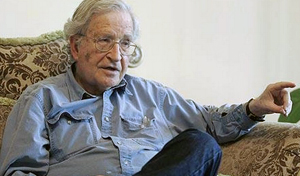New Delhi, Feb 21: Renowned thinker and academician Noam Chomsky has questioned JNU Vice Chancellor M Jagadesh Kumar's decision to allow police on its campus in connection with the row over an event there against the hanging of Parliament attack convict Afzal Guru.
"Many of us remain very concerned about the crisis in JNU, which was apparently created and precipitated by the government and university administration with no credible evidence of any seditious activities on campus.
"Why did you allow the police on campus when it is clear that this was not legally required?" Chomsky said in an email today to the JNU VC.
Students and teachers are protesting against the alleged "mishandling" of the issue by the university administration and have questioned the decision to allow the police "crackdown" on the JNU campus.
The administration in its defence has been maintaining that "the university was bound to do so" even as it was contended by the protesting students and teachers that the matter related to indiscipline and not sedition.
"I never invited the police to enter the campus and pick up our students. We only provided whatever cooperation was needed as per the law of the land. We were bound to do so," the VC had said.
Chomsky, along with Nobel laureate Orhan Pamuk and 86 other academicians from renowned universities abroad, had last week condemned "the culture of authoritarian menace that the present government in India has generated" and said those in power are replicating the dark times of the oppressive colonial period and of the Emergency of the 1970s.
"We have learnt of the shameful act of the Indian government which, invoking sedition laws formulated by India's colonial rulers, ordered the police to enter the JNU campus and unlawfully arrest a student leader, Kanhaiya Kumar, on charges of inciting violence -- without any proof whatever of such wrongdoing on his part," the joint statement had said.
The JNU students union president was arrested on February 12 in connection with a case of sedition and criminal conspiracy that was registered following an event on the varsity campus to protest against the hanging of Parliament attack convict Afzal Guru during which anti-India slogans were allegedly raised.
The university had set up a high-level committee to probe the issue and, on the basis of its preliminary report, academically suspended Kanhaiya and seven other students. The committee will come up with its final report by February 25.






Comments
Wa Wa Master Rakesh Ananna, which part of the world are you leaving you Bull of the Gate!!! not knowing about Famous Noam, looks like Chaddi Criminal, you are Justifying Goonda Criminals, You know how these Delhi police enter the JNU Campus can you Justify it, is it allowed that means all Master Plan Bapooji, do not mind you Baboons, \Every Dog gets its own day'
Jai Hoo Moodiji
Jai Hindustan."
who is this man to dictate ? this is being fuelled by ISI and ISIS with the support of local muslim population and some left retards .
Dear Ravi, As per your statement, the indians who are staying outside should not comment. Then why you people go outside country for fund and their support. Then ban to go outside the country. Can you provide all these people job, accomodation and food? Be realastic. They are the one who send the dollors, which is required to run the country. Without their support, you will not prosper.
Add new comment